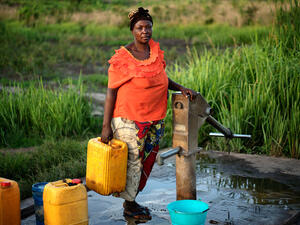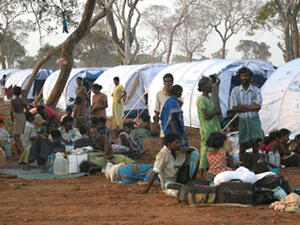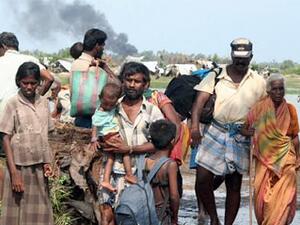Brazil honours refugee integration initiatives
Brazil honours refugee integration initiatives

CONARE President Luiz Paulo Teles Barreto (left) presents an award to Brazilian MP Carlito Merss for promoting legislation aimed at protecting and assisting refugees.
BRASILIA, Brazil, December 6 (UNHCR) - The Brazilian government has recognized 25 organizations and individuals, including a senior official of the UN refugee agency, for their valuable work in smoothing the integration of refugees.
The Brazilian Justice Ministry's National Committee for Refugees (CONARE), in a public ceremony here on Tuesday to mark the 10th anniversary of the country's refugee law, paid tribute to those working in fields such as health, employment, education and nutrition. Those honoured each received a trophy and a certificate of recognition.
"It's not enough to simply accept refugees in our country," said Luiz Paulo Teles Barreto, president of CONARE. "This ceremony shows that with commitment and responsibility everybody can help ensure the success of integration."
Two publications related to refugee issues were also launched at the ceremony: a report on Brazil's national refugee law and the work of CONARE, and a UNHCR study on the implementation of the 2004 Mexico Plan of Action. The latter, endorsed by 20 Latin American countries, aims to provide protection and find durable solutions for refugees in the region.
Luis Varese, UNHCR's representative in Brazil, was among those honoured by CONARE, which was set up after the promulgation of the refugee law in 1997. He paid tribute to the national refugee committee.
"The effective functioning of CONARE guarantees in Brazil the application of UNHCR's cornerstone work, which is international protection," added Varese, who was himself honoured for his work in this country.
Others recognized on Tuesday for their work in helping refugees integrate included a fruit and vegetable distributor which employed refugees in the northern city of Natal; a Rio de Janeiro hospital that offered special treatment to refugees; and two public universities for granting scholarships to refugees.
Three social services organizations in the trade and industry sectors were also awarded certificates for offering free training and technical courses to refugees living in São Paulo.
Two members of parliament, Carlito Merss and Eduardo Suplicy, and a senior local government official in São Paulo, Aluysio Nunes Ferreira, were honoured for their work in promoting legislation aimed at protecting and assisting refugees.
UNHCR played a vital role in helping the Brazilian government draft its refugee law, which formed the basis of a protection policy for refugees. Today, there are some 3,500 recognized refugees from 69 different countries living in Brazil.
The huge, vibrant South American nation has also resettled almost 400 refugees under a 1999 agreement with UNHCR. The figure includes more than 100 Palestinians who have arrived in Brazil earlier this year from a desert camp in Jordan.
By Valéria Graziano in Brasilia, Brazil









